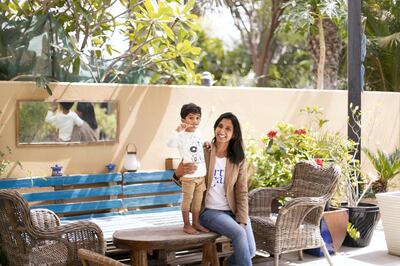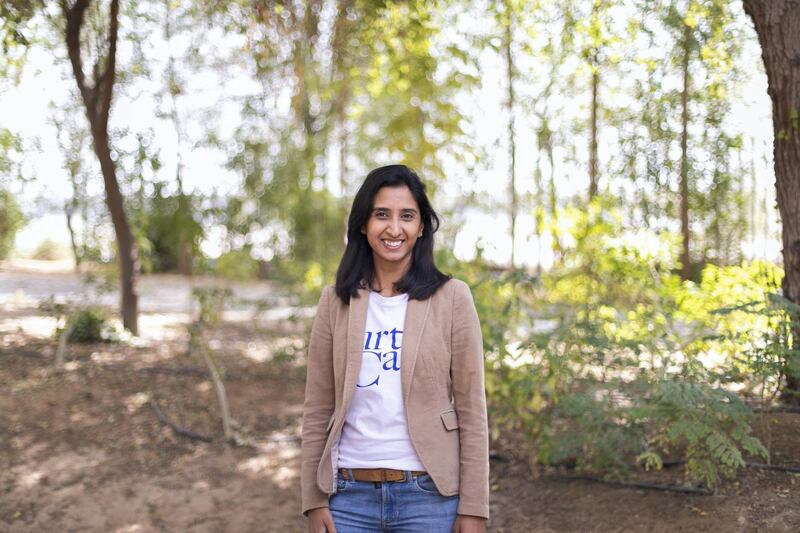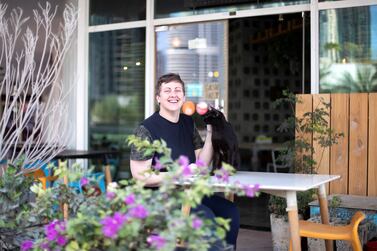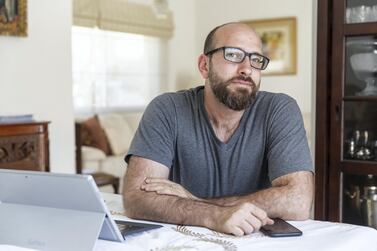Geetanjali Kaul, 35, was inspired to co-found children's activity booking app TurtleCard while trying to keep her son engaged in social, physical and developmental activities. Launched with an entrepreneur friend last October, it also helps digitise small activity businesses that didn't have online payments. Indian-born Ms Kaul has spent 12 years in Dubai and lives in Arabian Ranches with her husband, a regional general manager for an Indian telecoms brand, and her 3-year-old son Abhimanyu.
How did your upbringing shape your attitude towards money?
My father served in the Indian Air Force in administration, which meant we didn’t have a fixed location. Moving every two years within India you adapt fast. I would go to a new place, meet new friends. It becomes part of your DNA when you enjoy that change.
My father spent 20 years with the Air Force before becoming head of HR for one of the big denim-producing companies. My mother worked with the State Bank Of India, in the back office. I was the only child. I knew what my parents could afford, so my demands never surpassed that. Both were working, so we were comfortable. The value of money was made clear to me at a very early stage. Growing up in India you see people less privileged understand the actual value of money — you might have a little more but things can go bad any day.
Did you receive pocket money?
I did; 100 rupees a month (Dh5), but because most of my needs were met I would end up saving it. There were times — I must have been aged 10 — I would give it back to my parents because they needed money when there was none at home and something came up.
How much were you paid in your first job?
As a management trainee for Jumbo Electronics — retailers and distributors for electronics — I was paid Dh6,500. We got housing in the first two to three years as well. That brought me to Dubai in 2007. It helped me understand Middle East/GCC markets. You need to get your hands dirty in retail, see the customer face-to-face, understand how he works. After five years I moved to BlackBerry, managing UAE marketing.
Are you a spender or a saver?
You can’t be one of the two; you need to do both — what’s important is what you’re spending on and how you’re saving. Early on (when I started earning) I spent a lot on travelling. If I’d saved that money I’d have made a mistake because experiences I got through travelling enriched me, formed my personality. Now most of my spending is on my business. I’ve always been saving, but I’ve not stopped myself from spending on things that have added value or made me happy.
How do you save?
It got more structured as I got older, more responsibilities. I made an effort to save in my 20s; into my 30s that concept had to be more formalised. Once I got married in 2012, had a child, we said we have to save X amount on a quarterly basis in stocks and gold. We bought this house in 2015. I should have bought much earlier, not spent so much in rent, but that rent is being saved as an investment now.
What is your most cherished purchase?
The house. Sometimes you look at the value, the monetary side, but this is cherished because I look at my boy opening the door, running into the garden; he can play in parks, has a community. He’s living a childhood that I lived which is unseen today for a lot of kids because of scarcity of space.

What is your best investment?
Our vacations and experiences; going home to see family in India or exploring new countries. We like countryside, road-tripping, taking time to understand the culture. This is enriching and satisfying — you realise there’s a lot of goodness in the world. My latest favourite is the Nordics; we’ve done two trips to Norway.
What prompted you to launch TurtleCard?
The idea started six months after I left my previous job, to spend more time with Abhimanyu. I had decided I wanted to do something of my own. I was sitting at one of the activity centres where I would take him every week. By the third week he was getting bored. I couldn’t find the right activities to engage him in and I started meeting more mothers talking about the same problem. I realised there was a gap in the market. I asked myself ‘why can’t it be easy to take him to multiple places at the click of a button — there has to be a more digital way’. So Abhimanyu is the reason for this whole thing. We’ve signed up over 2,000 customers and 50-plus merchants, which translates to almost 350 types of activity.
How does the business make money?
The service is free to use for parents, who find activities and book through the portal. We get commission every time you make a booking with the merchant. We help by giving them new customers; only charging them when we bring confirmed bookings. A lot of centres don’t have facilities to take online payments, so we’re also digitising them.
What is your philosophy towards money?
Money is basically a means to measure effort and success. It’s a barometer of your acumen, dedication and hard work, but it’s not an end by itself. I strongly believe money saved at the right time and spent on the right things can help you achieve great things in life.
What’s been your key financial milestone?
The first was buying my house. The second is when in the second month of TurtleCard going live I saw billings coming through, having real customers pay money to use my service. That was validation. You believe in your idea but you know you’re on the right path when somebody thrusts you with their money.
Do you prefer paying by cash or credit card?
Credit card. Convenience, for sure, the cashback — who doesn’t want money back — but a credit card also helps you review your spending at the end of the month. With cash you can keep receipts, but it’s inconvenient to keep track where money is going.
Are you wise with money?
Absolutely. I like to spend, but I’m wise about where I’m spending. It’s not impulse or emotion driven. I give it thought every time, more so now because a chunk of my savings is fuelling my business. I don’t drive myself crazy to find the best deal to save Dh1. If I can make a little saving, fine, but convenience should be a part of that.
Do you plan for the future?
We have put together a plan, quarterly savings and the business is one of our biggest plans for the future, to bring us enough money to pay for our son’s education and fuel our vacations.
What would you raid your savings for?
You can never plan for a family emergency. God forbid something happens, you have to raid savings. Plus if an opportunity comes with respect to my son’s education … Hopefully, if we’ve planned well, it should cover that.








